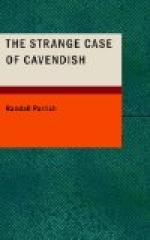“Then hop to it,” Farriss rejoined. “Stick around there until you get something deeper. As for me—I’m going home. It’s two o’clock.”
CHAPTER VI: AT STEINWAY’S
It was the second night after Farriss had given them his instructions that Miss Donovan and Willis, sitting in the last darkened booth in Steinway’s Cafe, were rewarded for their vigil. The booth they occupied was selected for the reason that it immediately joined that into which Willis had but three days before seen Cavendish and the La Rue woman enter, and now as they sat toying with their food, their eyes commanding the entire room, they saw a woman swing into the cafe entrance and enter the booth directly ahead of them.
“La Rue!” whispered Willis to Miss Donovan.
Ten minutes later a young man entered the cafe, swept it quickly with his eyes, then made directly for the enclosure occupied by his inamorata. The man was Cavendish.
In the booth behind. Miss Donovan and Willis were all attention, their ears strained to catch the wisps of conversation that eddied over the low partition.
“Pray for the orchestra to stop playing,” whispered Miss Donovan, and, strangely enough, as she uttered the words the violins obeyed, leaving the room comparatively quiet in which it was not impossible to catch stray sentences of the subdued conversation.
“Well, I’m here.” It was John’s voice, an ill-humoured voice, too. “But this is the last time, Celeste. These meetings are dangerous.”
“Yes—when you talk so loud.” Her soft voice scarcely reached the listeners. “But this time there was a good reason.” She laughed. “You didn’t think it was love, did you, deary?”
“Oh, cut that out!” disgustedly. “I have been foolish enough to satisfy even your vanity. You want more money, I suppose.”
“Well, of course,” her voice hardening. “Naturally I feel that I should share in your good fortune. But the amount I want now, and must have to-night—to-night, John Cavendish—is not altogether for myself. I’ve heard from the West.”
“My God! Has he been located?”
“Yes, and is safe for the present. Here, read this telegram. It’s not very clear, but Beaton wants money and asks me to bring it.”
“You? Why does he need you?”
“Lack of nerve, I guess; he’s out of his element in that country. If it was the Bowery he’d do this sort of job better. Anyhow, I’m going, and I want a roll. We can’t either of us afford to lie down now.”
Cavendish half smothered an oath.
“Money,” he ejaculated fiercely. “That is all I hear. Enright has held me up something fierce, and you never let me alone. Suppose I say I haven’t got it.”
“Why, then, I’d laugh at you, that’s ail. You may not love me any more, my dear, but surely you have no occasion to consider me a fool. I endeavour to keep posted on what the court is doing in our case; I am naturally interested, you know. You were at the Commercial National Bank this afternoon.”




